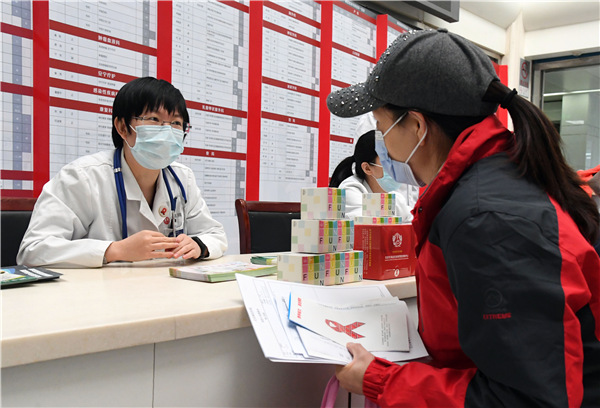 |
A medical professional with Beijing Haidian Hospital introduces material on AIDS prevention to a visitor during a free consultation event in Beijing on World AIDS Day on Dec 1. [Photo/Xinhua] |
With a stethoscope, flashlight, medicine kit and blood pressure meter, doctor Fan Yunfu busily shuttles between inpatient wards. This is not uncommon for many doctors, however, Fan's patients are prisoners with HIV/AIDS.
Fan, head of the Jianshui Prison Hospital, Southwest China's Yunnan province, devoted himself to patients from the Eighth Prison Yard, which was set up in 2008 exclusively for prisoners who are either HIV carriers or AIDS patients.
"Intravenous drug use was once a major cause of HIV infections in Yunnan, as it borders the Golden Triangle, an area notorious for narcotics, and the yard was set to tackle a large number of handcuffed HIV/AIDS patients at that time," Fan says.
Since then Fan and his colleagues have worked around the clock for this special group that most people tend to be frightened of.
Occupational exposure
"At first, it was like wading across the stream by feeling the way," Fan says. "With no previous experience to fall back on and a high possibility of occupational exposure, many medical staff members felt wishy-washy."
In 2016, when doctor Zhao Jianquan was doing general maintenance of equipment, a tube containing an HIV-positive blood sample suddenly burst, causing blood to spray out.
Though wearing glasses and a mask, Zhao still got some blood on her cheeks and forehead.
"For a moment, my mind went totally blank," Zhao says. "I had small open wounds on my face."
She then took antiviral drugs for one month, and the three-month window for diagnosis was a nightmare. "It is a painful memory, and I often ask myself what I would have done if I was infected."
"It would be a lie if I said I was not nervous or fearful but since things happened, I told myself to take it easy," says the doctor.
Six months later, Zhao got the result of her HIV test-it was negative.
"I felt very lucky. I can only use 'lucky' to describe how I felt at that time. I was so lucky," she says.
So far, there have been nine occupational exposures in Jianshui Prison Hospital. Doctors took blocking drugs for about a month each time, suffering both physically and mentally. Fortunately, none of them were infected.
Life and death
Lacking basic knowledge about the disease, many prisoners here believe they would not live longer than their sentences. Thus, self-loathing and resistance to treatment occur from time to time, according to Fan.
In March 2016, AIDS caused the lower limbs of a prisoner surnamed Kui to fester extensively, and he was unable to take care of himself. On the second day of admission to the hospital, desperate Kui tried to commit suicide but was saved by medical staff.
"The then head of the hospital Tang Shunbao and other doctors and nurses kept persuading me. The nurses changed the dressings for my wound every day," Kui says."It smelled bad, but they never made me feel bad."
After repeated persuasion and patient treatment, Kui gradually changed his attitude and became more cooperative with the treatment. The man can now basically walk independently.
"It was doctors in the prison who gave me a second life," says Kui, who was told to have an amputation by several hospitals at that time.
Despite careful treatment, the doctors also face major challenges.
In 2017, AIDS caused a decreased number of blood cells for a prisoner surnamed Pan, leaving him in critical condition. Pan's wife rushed to the hospital with their newborn child only to find that her husband died of respiratory failure after hours of rescue procedures.
For doctor Wang Jinhong, Pan's death will always be a horrible memory. "I could not accept that. A fresh life was lost. I felt so bad."
New blood
Wang considered giving up, but after overcoming psychological barriers, she threw herself into the battleground of fighting HIV/AIDS without hesitation.
Wang says what they are doing is meaningful. "I feel relieved as more doctors are engaged in the career," says the retiring Wang, who was also one of the few female doctors in the hospital.
Yunnan has seen a growing number of HIV/AIDS doctors behind bars, and 26-year-old Song Shilin is one of them.
Song, with more than two years of work experience, says he was nervous at first when treating the special patients but has gradually adapted to the work of an HIV/AIDS doctor now.
"Doctors should treat indiscriminately. All we can do here is to cure sometimes, to help often and to comfort always," he says.
Xinhua